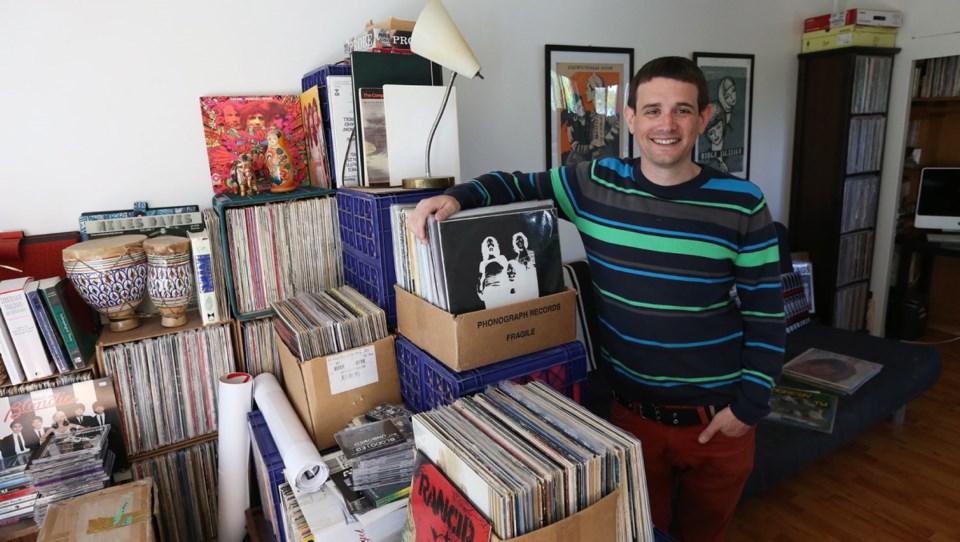Jason Flower’s fantastical journey in music has taken him to some faraway places.
Poland, India, Italy, Spain, Portugal, Switzerland. All the while, Flower kept tabs on music being produced at home and abroad, which resulted in the creation of Supreme Echo, his archivist record label.
Quality and presentation are priorities for Flower, who has laboured over every Supreme Echo release to date.
He began releasing out-of-print or impossible-to-find recordings on his label in 2001, and has a catalogue that now ranges from a compilation of underground Bulgarian music to a re-issue of hard-to-find recordings by Victoria punks the Neos.
He has another album ready for release this weekend: Three, a live compilation of unreleased songs from 1970s Victoria punk trio the Dishrags. Flower will follow that LP with a 1972 release from Triton Warrior, a Black Sabbath-sounding group from Victoria.
Most recordings on the label run about 500 copies, Flower said, while almost everything on his imprint (save for a CD by Soviet-era underground act Retseptis) is issued on high-quality vinyl.
With such a business model, it’s no surprise there is very little money to be made.
“The cost per unit is very, very high,” Flower said. “For me, I see this as therapeutic.”
While growing up in Victoria, he was involved in all facets of music and music-making, mostly via musical projects like Stick Farm and Mexican Power Authority.
As he got older, his focus shifted slightly. Flower spent much of his 20s and 30s backpacking, hitchhiking and squatting across Europe, albeit with a single-minded focus on music and everything that entails.
Flower left Victoria at 24, playing his way across the country with his band, Third World Planet, eventually stopping in Montreal. He spent the next decade-and-a-half doing something or other related to music, be it hauling gear for a Japanese punk band to living in India for six months.
“India changed my life,” he said. “It cleaned my naiveté about the world, about life, about people. I found that despite the chaos at the time in that country and/or poverty, there was a harmony.”
Poland had a similar effect on him. He spent almost a decade bouncing between Victoria and Poland, a stint that saw him hatch the idea for both Supreme Echo and All Your Ears Can Hear, a collaborative book-CD project from 2007 which documented the Victoria punk scene between 1978 and 1984.
Flower moved back to his native Victoria a few years ago, but his fondness for the foreign has not ebbed. He credits that to his time in Poland, which affected his thinking considerably.
“It was at that point I realized how you could connect music with a political era and its impact on people, and the message it had within it. That’s the moment I realized there was a whole mystery to be uncovered and a larger story to be told.”
Flower’s archival releases on Supreme Echo are extensively researched, documented and presented. He has a mandate for everything he puts out, too. “I am concerned mostly with music that either a) has a sentiment; or b) has a cultural relevance.”
There is another benefit to being self-governed, he joked. “I can take as long as I want.”
Given how Flower’s career has panned out, it is ironic that one of his earliest metal bands, Dementia, from 1987, featured bassist Sam Dunn, who has gone on to a career as a documentary filmmaker who also explores music in other countries.
Was there something in the Victoria water back then? Absolutely not, Flower said. In fact, the myriad musical communities were too segregated for his liking, even when he was an eager student at Parkland Secondary commuting into Victoria for shows.
“I listened to punk and metal at the same time,” Flower said. “But I didn’t get accepted into either group when that stuff was important. When you’re a kid, that’s your world.”
That shaped his mindset as a teenager — much as his time in Poland did as an adult.
“Most of my [Polish] friends are both politically minded and very intellectual. If I can pull off sounding profound, people take the arts a lot more seriously there. I found the way people discuss music, music history and subculture to be with a much higher regard and level of intellect.”



